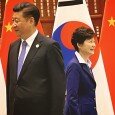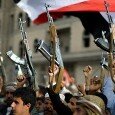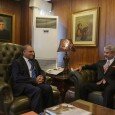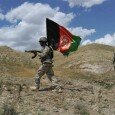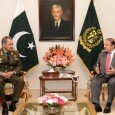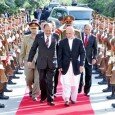By Faisal Raza Khan –
Pakistan has traditionally advocated its foreign policy objectives with the following mission statement, ‘develop friendly relations with all countries of the world, especially major powers and immediate neighbours’. But while the major powers have been duly pandered to, over the years, there has not been much development on the friendly relations with immediate neighbours front.
Today, most observers believe that Islamabad is completely isolated within its own region, especially after the political emergence in the immediate east of Narendra Modi, and in the immediate west, of Abdullah-Abdullah. We now also have northern neighbours complaining about non-state actors sheltered in Pakistan, disturbing their peaceful civic lives. The Chinese have expressed concerns over the Uyghur militants conducting their operations from Pakistan multiple times.
On what should be straightforward, not overly politicized matters of trade and commerce, we are now having to play hardball with our nieghbours. Every high level cross border interaction is rife with tensions, the stated objectives of our foreign policy are grossly unmet. Much of that has to do with the lack of independence the foreign offices and trade and commerce ministries enjoy from our security establishment, it’s hard to foster amicable relations from behind the narrow end of a gun.
This is nowhere truer than in the case of Iran.
Nawaz Sharif recently visited Iran to thaw out relations that had once again frozen due to our militantly evolving stance on the political and ethnic crises in Syria, and Pakistan’s multi-layered affiliation with Middle Eastern lobbies that openly preach sectarian hatred against Shias.
Much neighbourly goodwill has been sacrificed in the desire to please and appease Saudi Arabia. The incumbent government, like some others before it, has tried to make a balanced approach in relations with the two countries, but beyond statements to the press and intermittent delegations, there’s been no progress with closer to home Iran. The incumbent government, like others before it, owe many debts in farther Arab lands.
Sections of the PML-N even have links with banned Sunni militant outfits like Lashkar-e-Jhangvi and others that are involved in spewing sectarian hatred, and inciting violence against the Shia communities of Pakistan.
It was assumed before the May 11, 2013 polls that no matter who takes the upcoming government, the groundwork done on the Iran-Pakistan pipeline would not be quashed and that the work on the pipeline would continue as planned.
Soon after the elections though, the project entered a state of diplomatic purgatory. The PML-N leadership argued that moving forward with the aforementioned project would need a currently not feasible financial investment, and that it could provoke the United States to impose sanctions on Pakistan due to Iran’s nuclear program.
Now even as Iran and the US successfully negotiate the nuclear-issue among themselves, Islamabad remains unmoved on the pipeline. Energy starved Pakistan urgently needs gas, but it must come from the ‘right’ places.
A simple matter of commerce and trade has been turned into an international issue of religious ideology, the message comes from the holy lands of Arabia, Pakistan needs Sunni, not Shia gas.
Turkey and Iraq are both getting natural gas from Iran regardless of several sanctions from the US. Praises of Turkey have been sung in our political corridors, hands of friendship extended warmly, but when it comes to following their example, well, we simply won’t. The research suggests that the gas project can provide more than 4000 Mega Watts of energy, but the research can’t realign our foreign policy.
Earlier this year, Pakistan received Saudi gifts of crude oil at deferred payment, a lump sum monetary donation of 1.5 billion dollars, F-16’s from Jordan and more manpower export offers from Bahrain.
These gifts precipitated a complete u-turn regarding our Syria policy, and now there are rumours of exporting trained militants to Gulf and Middle Eastern states, and even suspicions of sending the trainers themselves to Bahrain and Jordan via Turkey.
There are also stories of transferring large quantities of land to Saudi owners in Balochistan, to help them keep closer tabs on Iran. The already insecure border, the Sunni militant camps within Balochistan, the cross border trafficking of human beings and narcotics are all major issues between Pakistan and Iran.
On February 6 of this year the Iranian government directly blamed Pakistan for giving refuge to terrorists and later threatened to unilaterally act inside Pakistani territory, if Islamabad didn’t help them round up the militant group ‘Jaish-al-Adle’, which it blamed for having abducted five Iranian border guards.
Four were released in April but one, Jamshid Danaeifar, still remains somewhere in Pakistan’s south-western province. Iran has since expressed a trust deficit when it comes to Pakistan.
On the face of it, there are several avenues of cultural, economic and commercial cooperation between the two countries. Big projects like establishing a coastal refinery at Gwadar, the Iran-Pakistan gas pipeline, SANDAK, the purchase of crude oil on hard cash payments, the supply of diesel and furnace fuel, oil exploration; but as things stand, Islamabad and Tehran might as well be on different planets.
That is the way it will remain as well, until Pakistan can chalk out an independent foreign policy and stop getting friendly directives from brotherly countries. Foreign policy objectives should serve national interests, not international ones.
The writer is senior correspondent on foreign policy and diplomacy, Dunya News






















































































